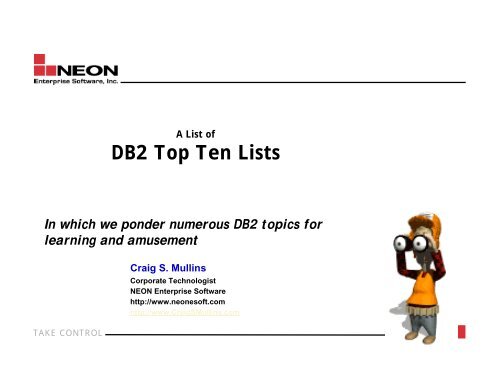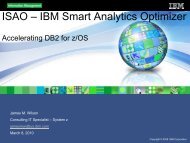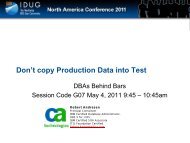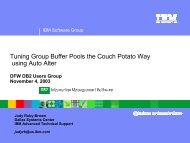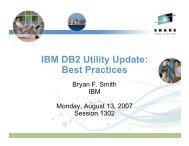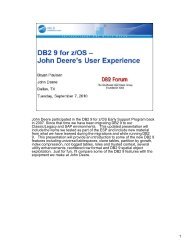A List of DB2 Top Ten Lists - DFW DB2 Forum
A List of DB2 Top Ten Lists - DFW DB2 Forum
A List of DB2 Top Ten Lists - DFW DB2 Forum
You also want an ePaper? Increase the reach of your titles
YUMPU automatically turns print PDFs into web optimized ePapers that Google loves.
A <strong>List</strong> <strong>of</strong><strong>DB2</strong> <strong>Top</strong> <strong>Ten</strong> <strong>List</strong>sIn which we ponder numerous <strong>DB2</strong> topics forlearning and amusementTAKE CONTROLCraig S. MullinsCorporate TechnologistNEON Enterprise S<strong>of</strong>twarehttp://www.neones<strong>of</strong>t.comhttp://www.CraigSMullins.com
The <strong>Top</strong> <strong>Ten</strong> <strong>List</strong>sAnd now, from the home <strong>of</strong>fice inSugar Land, Texas… a series <strong>of</strong><strong>DB2</strong> <strong>Top</strong> <strong>Ten</strong> lists about varioustopics ranging across thefollowing subjects:• Performance• Coding•Design• Administration• Management• Features•ToolsTAKE CONTROL© 2007 Craig S. Mullins 1
<strong>Top</strong> <strong>Ten</strong> SQLCODEs to Memorize1. 000 / +100 successful / “no more rows”2. -904 resource unavailable3. -818 timestamp mismatch4. -101 SQL statement too complex5. -104 illegal symbol in SQL stmt.6. -530 / -532 RI constraint violation7. -803 unique violation (duplicate data)8. -913 deadlock or timeout9. -922 authorization failure10. -805 program not found in planTAKE CONTROL© 2007 Craig S. Mullins 2
<strong>Top</strong> <strong>Ten</strong> <strong>DB2</strong> V7* Features* or V6 refresh1. Real Time Stats2. Scrollable Cursors3. SQL Procedure Language4. Declared Temporary Tables5. Identity Columns6. Limited FETCH7. Stored Procedure Builder8. Historical Statistics9. External SAVEPOINTs10. Deferred Data Set CreationTAKE CONTROL© 2007 Craig S. Mullins 3
<strong>Top</strong> <strong>Ten</strong> <strong>DB2</strong> V8 Features1. 2M SQL Limit2. Partitioning changesup to 4096 Partitions, table-based partitioning, clustering separation3. Stage 1 for Unlike Data Types4. Data Partitioned Secondary Indexes5. Sequences6. Materialized Query Tables7. Multi-Row FETCH and INSERT8. Dynamic Scrollable Cursors9. Recursive SQL10. Online Schema ChangeTAKE CONTROL© 2007 Craig S. Mullins 4
<strong>Top</strong> <strong>Ten</strong> <strong>DB2</strong> 9 for z/OS Features1. Universal Table Spacesand no more creation <strong>of</strong> simple table spaces (still supported if you have them tho’)2. Rows arranged for variable data3. Index on Expressions4. ORDER BY and FETCH FIRST on Subselects5. Clone Tables6. Not Logged Table Space …but beware7. BINARY / VARBINARY …at last, a true binary data type!8. Native SQL Procedure Language …no more C compiler9. SELECT from UPDATE, DELETE, MERGE10. Implicitly Hidden Columns11. And, OK, I guess I have to include it, pureXMLTAKE CONTROLhttp://www.db2portal.com/blog.html© 2007 Craig S. Mullins 5
<strong>Top</strong> <strong>Ten</strong> Most Common <strong>DB2</strong>Performance Problems1. PEBCAK2. Poorly coded SQL3. Improper indexing4. Bad program design5. Bachelor programming syndrome6. Improperly defined buffer pools7. Index / table space needs to be reorganized8. Improperly designed database structures9. Copied code syndrome10. RUNSTATS not up-to-date (or not even run)TAKE CONTROL© 2007 Craig S. Mullins 7
<strong>Top</strong> <strong>Ten</strong> Steps to Proper Indexing1. Index by workload, not by object2. Build indexes based on predicates3. Index most-heavily used queries4. Index important queries5. Index to avoid sorting (GROUP BY, ORDER BY)6. Create indexes for uniqueness (PK, U)7. Create indexes for foreign keys8. Consider adding columns for IXO access9. Don’t arbitrarily limit number <strong>of</strong> indexes10. Be aware <strong>of</strong> I/U/D implicationsTAKE CONTROL© 2007 Craig S. Mullins 8
<strong>Top</strong> <strong>Ten</strong> Most Common Physical<strong>DB2</strong> Database Design Mistakes1. Relying on the defaults2. Not basing the physical on a logical model3. Over-relying on logical design4. Normalization problems(Over-normalized or too denormalized)5. Not enough indexes6. Indexing by table, not by workload7. Too much (or not enough) free space8. Failing to plan for data purging or archiving9. Failure to share data(not Data Sharing, but sharing data!)10. KludgingTAKE CONTROL© 2007 Craig S. Mullins 9
<strong>Top</strong> <strong>Ten</strong> Most CommonMisunderstandings About <strong>DB2</strong>1. “There’s a problem with <strong>DB2</strong>!”2. Using nulls can save space3. <strong>DB2</strong> is a “database”4. <strong>DB2</strong> is self-managing!5. SQL is simple to learn and code (properly)6. If it uses an index it doesn’t need ORDER BY7. Extents don’t matter anymore8. Using BP0 only performs OK9. PIECESIZE matches up IX and TS partitions10. It depends!TAKE CONTROL© 2007 Craig S. Mullins 10
<strong>Top</strong> <strong>Ten</strong> Most Under-UtilizedFeatures <strong>of</strong> <strong>DB2</strong>TAKE CONTROL1. Real Time Stats2. CASE statements3. Table Expressions4. DISTINCT Types5. LOBs6. User-Defined Functions7. Triggers8. Recursive SQL9. Date/Time Data Types10. Dynamic SQL ↓© 2007 Craig S. Mullins 11
<strong>Top</strong> <strong>Ten</strong> Extinct* <strong>DB2</strong> Features1. Type 1 indexes2. The RCT3. Host variables w/o a colon4. SROD5. Data set passwords6. Simple table spaces7. Manual stored procedure registration8. Non-DRDA distribution9. Hiperpools (and VPs in data spaces)10. Denormalization (because <strong>of</strong> MQTs?)TAKE CONTROL* or soon to be extinct© 2007 Craig S. Mullins 12
<strong>Top</strong> <strong>Ten</strong> <strong>DB2</strong> Annoyances1. Changing the SQL Terminator for Triggers2. No EXPLAIN parameter for CREATE TRIGGER3. Fumbling thru the SQL Reference for Syntax(specifically for SELECT)4. SQL examples are too simple in the manuals5. Lack <strong>of</strong> 100% Platform Compatibility6. Managing Tables with LOBs7. DSNZPARM documentation8. Utilities cost extra9. The database object is strangely implemented10. It is so good that people take it for granted!TAKE CONTROLLOAD, UNLOAD with LOBs V7 V8: PK22910© 2007 Craig S. Mullins 13
TAKE CONTROL<strong>Top</strong> <strong>Ten</strong> SQL Mistakes1. Syntax2. The “flat file” mentality3. Ignorance <strong>of</strong> New Features(such as CASE and table expressions)4. Fear factor5. Copied code syndrome6. Not coding for performance(ignorance <strong>of</strong> Stage 1/Stage 2, indexing, etc.)7. Too many columns! .8. Not running the most efficient SQL statement9. Improper “existence” checking10. The Never-Ending Story!© 2007 Craig S. Mullins 14
What’s Wrong With This SQL?SELECT LAST_NAME, FIRST_NAME,JOB_CODE, DEPT, PHONENOFROM DSN8810.EMPWHERE JOB_CODE = ‘A’AND DEPT = ‘MIS’;TAKE CONTROL© 2007 Craig S. Mullins 15
Existence Checking OptionsSELECT 1FROM SYSIBM.SYSDUMMY AWHERE EXISTS (SELECT 1FROM DSN8810.EMP BWHERE LASTNAME = ‘JONES’AND A.IBMREQD = A.IBMREQD);SELECT 1FROM DSN8810.EMPWHERE LASTNAME = ‘JONES’FETCH FIRST 1 ROW ONLY;http://www.dbazine.com/db2/db2-mfarticles/custard1/view?searchterm=randy%20custardTAKE CONTROL© 2007 Craig S. Mullins 16
<strong>Top</strong> <strong>Ten</strong> Buffer Pool Tuning Steps1. Do not use one large BP0 – spread the wealth!2. Use BP0 for system objects only3. Separate BP for indexes and table spaces4. Set DWQT to enable trickle writing5. Separate random and sequential6. Use VPSEQT to control sequential usage(increase for sequential, decrease for random)7. “Peg” (small) frequently used tables in memory8. Assign DSNDB07 to BP7 – tune it for sorting9. Do not undersize hiperpool if you use them(ROT: setup HP to be 2x – 3x the size <strong>of</strong> the VP it backs up)10. Consider dedicated buffer pools (for “special” table spaces)TAKE CONTROL© 2007 Craig S. Mullins 17
<strong>Top</strong> <strong>Ten</strong> DBA Excuses1. It depends.2. RTFM3. “Did you fill out the form?”4. “I’m busy.”5. “It’s working as designed – leave me alone.”6. IBM says…7. You couldn’t possibly understand why…8. “That’s what they said in class.”9. “Our standards say we do it this way.”10. “Because I’m the DBA, that’s why!”TAKE CONTROL© 2007 Craig S. Mullins 18
<strong>Top</strong> <strong>Ten</strong> Programmer Excuses1. “There’s something wrong with <strong>DB2</strong>!”2. “But I copied that from another program.”3. “It worked yesterday.”4. “Isn’t there something you can do to make it work?”5. “But I can do that better in C; Java; etc.”6. “It works that way in Oracle; Access; etc.”7. “It’s too late in the project to re-write that.”8. “But I heard somewhere it works this way.”9. “Why do I have to BIND every time?”10. “<strong>DB2</strong> is a hog.”TAKE CONTROL© 2007 Craig S. Mullins 19
<strong>Top</strong> <strong>Ten</strong> Management Excuses1. “We’re over-budget.”2. “The project is under-funded.”3. “Work smarter, not harder.”4. “You better work overtime on that.”5. “This comes from upper-level management.”6. “We’re running behind schedule on this.”7. “You can’t be out <strong>of</strong> the <strong>of</strong>fice that long.”8. “I read somewhere that isn’t how it works.”9. “When I was a DBA/programmer/etc. …10. “That is no longer strategic.”TAKE CONTROL© 2007 Craig S. Mullins 20
<strong>Top</strong> <strong>Ten</strong> Database Trends1. From Many to “3”2. Open Source3. The Giant Sucking Sound4. Complexity5. Heterogeneity6. Autonomic/Self-managingTAKE CONTROLMarketing7. Lies, lies, lies, yeah!8. The Checkbox Wars9. From VLDB to VHDB10. Application Centricity© 2007 Craig S. Mullins 21
<strong>Top</strong> <strong>Ten</strong> Types <strong>of</strong> <strong>DB2</strong> Tools1. Change Manager2. BIND and Access Path Analysis3. Catalog Visibility4. SQL Performance Monitor5. System Performance Monitor6. DBA Automation / Utility Automation7. Table Editor8. Recovery & Log Analysis9. Database Structure Analysis10. Application Restart ControlTAKE CONTROL© 2007 Craig S. Mullins 22
<strong>Top</strong> <strong>Ten</strong> Sources for<strong>DB2</strong> Information1. IBM manuals2. IDUG3. Local <strong>DB2</strong> user groups4. <strong>DB2</strong> Magazine(s)5. Vendor web sites/webinars(neones<strong>of</strong>t.com, etc.)6. <strong>DB2</strong> books7. Web portals(<strong>DB2</strong>portal.com, DBAzine.com, SearchDataManagement.com)8. IBM <strong>DB2</strong> Developer’s Domain9. Consultant web sites10. Your co-workers!TAKE CONTROL© 2007 Craig S. Mullins 23
<strong>Top</strong> <strong>Ten</strong> Books for<strong>DB2</strong> Pr<strong>of</strong>essionalsTAKE CONTROL1. <strong>DB2</strong> Developer’s Guide2. <strong>DB2</strong> Developer’s Guide3. <strong>DB2</strong> Developer’s Guide4. <strong>DB2</strong> Developer’s Guide5. <strong>DB2</strong> Developer’s Guide6. <strong>DB2</strong> Developer’s Guide7. <strong>DB2</strong> Developer’s Guide8. <strong>DB2</strong> Developer’s Guide9. <strong>DB2</strong> Developer’s Guide10. <strong>DB2</strong> Developer’s Guide© 2007 Craig S. Mullins 24
TAKE CONTROL© 2007 Craig S. Mullins 25
Available NowCraig S. MullinsNEON Enterprise S<strong>of</strong>tware, Inc.craig.mullins@neones<strong>of</strong>t.com<strong>DB2</strong> Developer’s Guide, 5edwww.craigsmullins.com/cm-book.htmhttp://www.craigsmullins.comDBA: Practices & ProceduresTAKE CONTROL© Copyright, Craig S. Mullins 2007www.craigsmullins.com/dba_book.htm
Intelligent Solutions for Enterprise Data.


